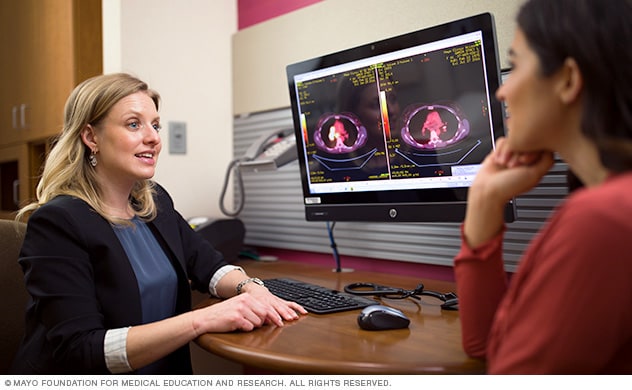Non-Hodgkin lymphoma care at Mayo Clinic
 Collaborative care
Collaborative care
At Mayo Clinic, we bring together teams of specialists dedicated to collaborating so that you receive accurate diagnoses and treatments the first time.
Your Mayo Clinic care team
Mayo Clinic specialists provide expert, personalized care to those with non-Hodgkin lymphoma, including very rare types of the disease. Specialists work with the Mayo Clinic Comprehensive Cancer Center to find the best treatments for you.
Your care team might include:
If you have other health conditions that could be affected by cancer treatment, your team may include other specialists. Your team works together to provide exactly the care you need.
Advanced diagnosis and treatment
Mayo Clinic pathologists who specialize in diseases of the blood (hematopathologists) are experienced in accurately diagnosing and staging all the subtypes of non-Hodgkin lymphoma, including very rare ones. Some types can be distinguished from each other only by advanced laboratory testing. Research shows that expert review by pathologists experienced with lymphoma is key to developing an appropriate treatment plan.
Mayo Clinic laboratories are equipped with the advanced technology doctors need to carefully analyze the DNA changes in your cancer cells to help choose the most appropriate treatment for you. Mayo Clinic offers genomic diagnostic testing to analyze the genes of lymphoma cells to determine your precise type.
Mayo Clinic doctors work with you to review all your treatment options and to choose the treatment that best suits your needs and goals. Treatments offered to people with non-Hodgkin lymphoma include chemotherapy, radiation therapy, immunotherapy, targeted therapy and bone marrow transplant.
Mayo Clinic offers chimeric antigen receptor T cell therapy, also called CAR-T cell therapy, for people with certain types of B-cell non-Hodgkin lymphoma. This treatment, offered through the CAR-T Cell Therapy Program, is an individualized cell-based regenerative medicine technique that involves genetically changing a subset of a person's white blood cells called T cells into CAR-T cells. The altered cells are reinfused into the body, where they activate the immune system to target cancer cells.
And because Mayo Clinic is a leader in lymphoma research, you also may have access to the latest treatments by way of clinical research studies, also called clinical trials.
In addition, Mayo Clinic lymphoma specialists hold regular multidisciplinary meetings to discuss treatment options. These specialists form the tumor board. The meetings include radiation oncologists, hematologists and others from Mayo Clinic campuses in Jacksonville, Florida, Scottsdale, Arizona, and Rochester, Minnesota. So no matter which Mayo Clinic campus you go to for your care, you benefit from the collective expertise of the lymphoma team.
Survivorship clinics for follow-up care
Mayo Clinic offers services for people who have completed non-Hodgkin lymphoma treatment through cancer survivorship clinics. Follow-up medical care is important for every person who is treated for non-Hodgkin lymphoma. The survivorship clinic offers evaluation for physical and psychological side effects, as well as provides plans for follow-up care and healthy living after cancer treatment. Sometimes follow-up care involves blood tests or bone marrow tests.
The Mayo Clinic experience and patient stories
Our patients tell us that the quality of their interactions, our attention to detail and the efficiency of their visits mean health care like they've never experienced. See the stories of satisfied Mayo Clinic patients.
Expertise and rankings
 Advancing care for people with non-Hodgkin lymphoma
Advancing care for people with non-Hodgkin lymphoma
Your Mayo Clinic doctor may talk with you about participating in a clinical trial.
Mayo Clinic doctors are widely respected for their expertise in diagnosing and treating people with all types of non-Hodgkin lymphoma, including the rare or aggressive. Each year, Mayo Clinic doctors care for thousands of people with non-Hodgkin lymphoma.
Nationally recognized expertise
Mayo Clinic is recognized for high-quality lymphoma care and research by national organizations.
- Mayo Clinic Comprehensive Cancer Center meets the strict standards for a National Cancer Institute-Designated Comprehensive Cancer Center. These standards recognize scientific excellence and a multispecialty approach focused on cancer prevention, diagnosis and treatment.
- Mayo Clinic is part of the Alliance for Clinical Trials in Oncology and NRG Oncology, which are international groups of scientists who work together to conduct clinical trials and reduce the impact of cancer.
Mayo Clinic in Rochester, Minnesota, Mayo Clinic in Jacksonville, Florida, and Mayo Clinic in Phoenix/Scottsdale, Arizona, are ranked among the Best Hospitals for cancer by U.S. News & World Report. Mayo Clinic in Rochester, Minnesota, is ranked as the top hospital in Minnesota, Mayo Clinic in Phoenix/Scottsdale, Arizona, is ranked as the top hospital in Arizona, and Mayo Clinic in Jacksonville, Florida, is ranked the top hospital in Florida.
Locations, travel and lodging
Mayo Clinic has major campuses in Phoenix and Scottsdale, Arizona; Jacksonville, Florida; and Rochester, Minnesota. The Mayo Clinic Health System has dozens of locations in several states.
For more information on visiting Mayo Clinic, choose your location below:
Costs and insurance
Mayo Clinic works with hundreds of insurance companies and is an in-network provider for millions of people.
In most cases, Mayo Clinic doesn't require a physician referral. Some insurers require referrals or may have additional requirements for certain medical care. All appointments are prioritized on the basis of medical need.
Learn more about appointments at Mayo Clinic.
Please contact your insurance company to verify medical coverage and to obtain any needed authorization prior to your visit. Often, your insurer's customer service number is printed on the back of your insurance card.
Dec. 04, 2024